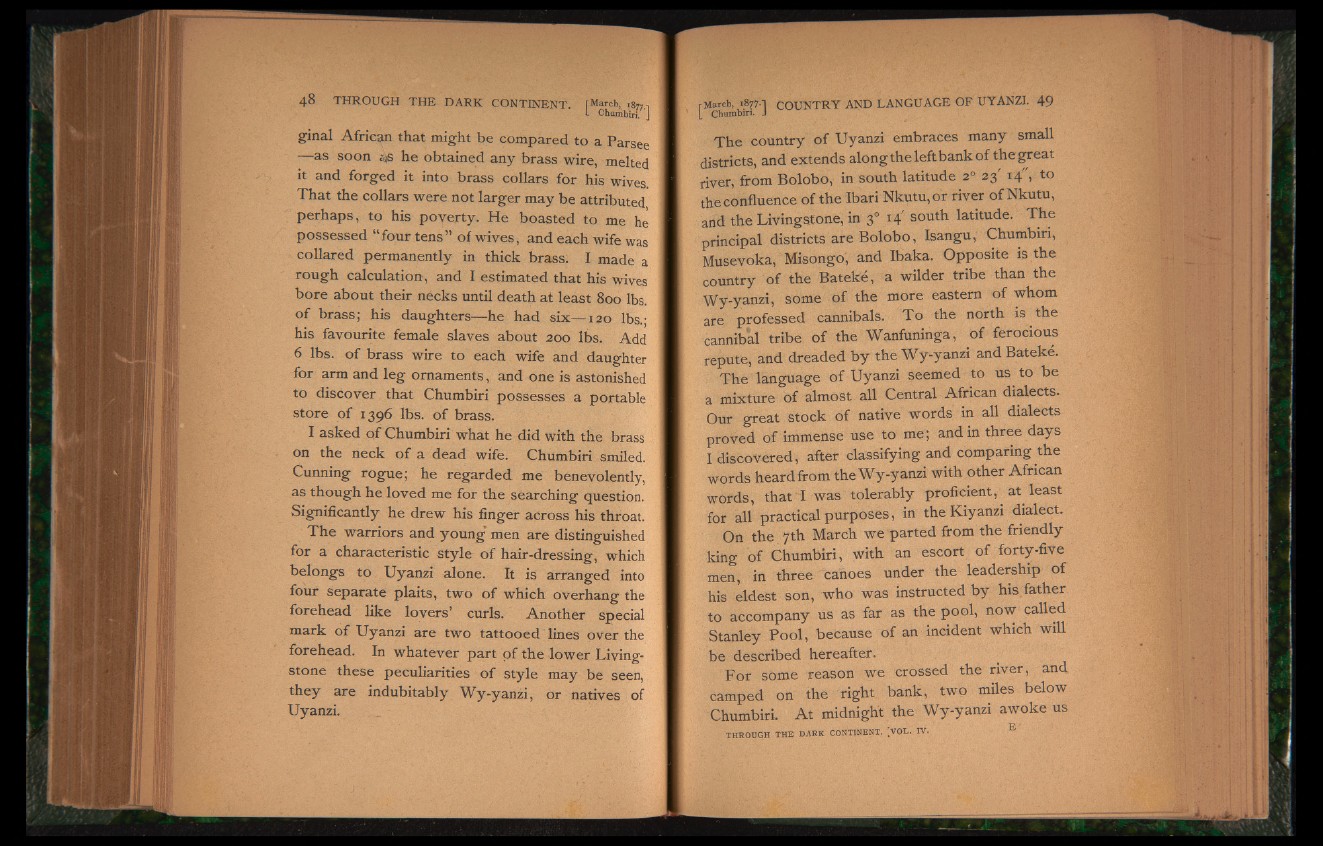
ginal African that might be compared to a Parsee
— as soon a^s he obtained any brass wire, melted
it and forged it into brass collars for his wives.
That the collars were not larger may be attributed
perhaps, to his poverty. He boasted to me he
possessed “ four tens” of wives, and each wife was
collared permanently in thick brass. I made a
rough calculation, and I estimated that his wives
bore about their necks until death at least 800 lbs.
of brass; his daughters— he had six— 120 lbs.;
his favourite female slaves about 200 lbs. Add
6 lbs. of brass wire to each wife and daughter
for arm and leg ornaments, and one is astonished
to discover that Chumbiri possesses a portable
store of 1396 lbs. of brass.
I asked of Chumbiri what he did with the brass
on the neck of a dead wife. Chumbiri smiled.
Cunning rogue; he regarded me benevolently,
as though he loved me for the searching question.
Significantly he drew his finger across his throat.
The warriors and young’ men are distinguished
for a characteristic style of hair-dressing, which
belongs to Uyanzi alone. It is arranged into
four separate plaits, two of which overhang the
forehead like lovers’ curls. Another special
mark of Uyanzi are two tattooed lines over the
forehead. In whatever part of the lower Livingstone
these peculiarities of style may be seen,
they are indubitably Wy-yanzi, or natives of
Uyanzi.
r March, 1877-] COUNTRY AND LANGUAGE OF UYANZI. 49
L Chumbiri. J
The country of Uyanzi embraces many small
districts, and extends alongtheleft bank of the great
river, from Bolbbo, in south latitude 20 23' 14", to
the confluence of the Ibari Nkutu,or river of Nkutu,
and the Livingstone, in 30 14' south latitude. The
principal districts are Bolobo, Isangu, Chumbiri,
Musevoka, Misongo', and Ibaka. Opposite is the
country of the Bateke, a wilder tribe than the
Wy-yanzi, some of the more eastern of whom
are professed cannibals. To the north is the
cannibal tribe of the Wanfuninga, of ferocious
repute, and dreaded by the Wy-yanzi and Bateke.
The language of Uyanzi seemed to us to be
a mixture of almost all Central African dialects.
Our great stock of native words in all dialects
proved of immense use to me; and in three days
I discovered, after classifying and comparing the
words heard from the Wy-yanzi with other African
words, that I was tolerably proficient, at least
for all practical purposes, in the Kiyanzi dialect.
On the 7th March we parted from the friendly
king of Chumbiri, with an escort of forty-five
men, in t h r e e canoes under the leadership of
his eldest son, who was instructed by his father
to accompany us as far as the pool, now called
Stanley Pool, because of an incident which will
be described hereafter.
For some reason we crossed the river, and
camped on the right bank, two miles below
Chumbiri. At midnight the Wy-yanzi awoke us
THROUGH THE DARK CONTINENT. [VOL. IV. ^